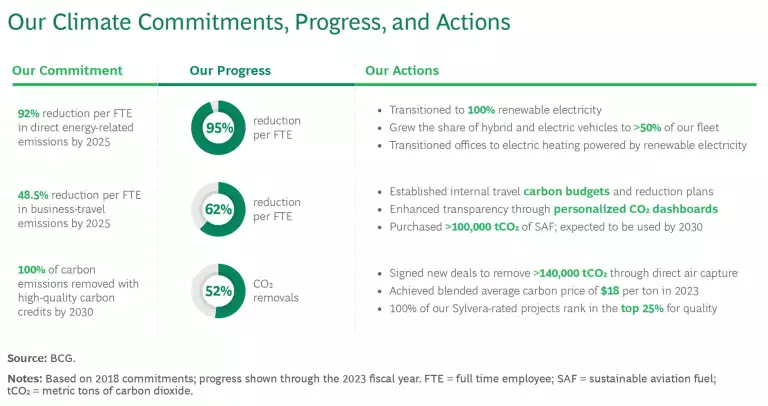Four years ago, BCG set a bold ambition to lead the way in climate action. Our commitments included:
- Halving our emissions intensity by 2025
- Neutralizing 100% of our remaining emissions by 2030 through high-quality carbon removal solutions
We are on track to achieve these goals. While our carbon footprint naturally decreased during the COVID-19 pandemic, we have become more intentional in our approach as we’ve returned to in-person interactions with clients and colleagues. We now carefully assess when and how we travel, prioritizing client value while actively minimizing our climate impact .
Additionally, we are investing in cutting-edge climate technologies. We have developed long-term purchase agreements to scale up the use of sustainable aviation fuel (SAF). We've also partnered with some of the most innovative companies to permanently remove CO2 from the atmosphere, using breakthrough technologies like direct air capture (DAC).
Below, we highlight our progress so far, the key challenges we've addressed, and the next steps in our climate journey.
Delivering on Our Commitments
In September 2020—despite there being no established corporate net zero standard to follow—we proactively set our own ambitious climate commitments for 2030, becoming the first large management consulting firm to do so. As an early mover, we recognized the crucial role we could play in setting a precedent and leading by example to drive industry-wide change.


To that end, we created a comprehensive emissions-reduction plan and established the following targets:
- Reducing our direct energy-related emissions by 92% per full-time employee (FTE) by
20251 1 Reduction targets based on 2018 emission levels, as validated by the Science-Based Targets initiative (SBTi) in 2021. - Reducing business-travel emissions by 48.5% per FTE by
20251 1 Reduction targets based on 2018 emission levels, as validated by the Science-Based Targets initiative (SBTi) in 2021. - Neutralizing 100% of our remaining emissions through high-quality carbon removal solutions by 2030
- Becoming climate positive beyond 2030—removing more carbon from the atmosphere than we emit each year
Our strategy included support for breakthrough climate technologies such as DAC and SAF—recognizing the importance of early-stage corporate support in helping these technologies scale through long-term partnerships. We also announced an average carbon price we expect to pay, which we anticipate will be approximately $35 per metric ton by 2025, rising to $80 by 2030.
Meeting Climate Targets Through Thoughtful Actions
Here are some of the strategies we have deployed to successfully reduce our carbon footprint and meet our climate commitments:
Reducing Energy-Related Emissions. By shifting to 100% renewable electricity to power our offices and transitioning to more than 50% hybrid and electric vehicles in our leased car fleet, we have reduced our direct energy-related emissions by 95% per employee.
Rethinking Our Approach to Business Travel. In 2023, we surpassed our Scope 3 target with a 62% reduction in business-travel emissions per FTE versus 2018 levels. While some of this progress was due to the gradual post-lockdown return to travel and aircraft efficiency gains, the majority of our emissions reduction was driven by intentional changes to our travel behavior. We deployed a multifaceted approach to carefully consider when and how we travel—for example, adopting purposeful colocation practices within our teams, rethinking how we organize large events, promoting greener travel options through policies and incentives, and enabling climate-informed decision making.
Investing in SAF. Currently, a very small share of flights globally use SAF. But we’re playing our part in changing this. We’ve been supporting SAF since 2021—last year, for example, we signed a five-year contract with World Energy that will reduce our emissions by 100,000 metric tons of CO2, equivalent to flying 177,000 economy-class passengers round trip between Boston and London. By 2030, we aim to replace at least 5% of our indirect jet-fuel consumption with SAF.
Introducing Carbon Budgets. A key strategic decision we made was to introduce annual internal carbon budgets for travel, managed by BCG leaders across regions and business units. Carbon-budget owners receive support from a global sustainability team and are equipped with internal reporting tools, emissions simulators, and playbooks to help them remain within their carbon budgets. Providing leaders with their own budgets and tools has empowered them to define their own roadmaps, simultaneously advancing business and climate objectives while creating a clear sense of shared ownership.
Starting next year, the total costs associated with our climate commitments—such as purchasing carbon credits and SAF—will be allocated to carbon-budget owners. Those who stay within their budget will bear lower costs, while those who exceed it will incur a higher share. This model effectively internalizes and distributes our carbon costs, empowering leaders to manage tradeoffs while reinforcing incentives to stay within carbon budgets.
Subscribe to our Climate Change and Sustainability E-Alert.
Removing Our Remaining Emissions
We have been a certified carbon-neutral company since 2018. In addition to reducing our emissions, we also purchase and retire carbon credits for all remaining emissions we generate each year. We are transitioning our portfolio from carbon avoidance credits (projects that avoid the generation of CO2) to carbon removal credits (projects that remove CO2 from the atmosphere).
Carbon removal credits represent half of our portfolio today and will make up 100% of our portfolio in 2030. This means that we will pay to remove every ton of CO2 that we generate. When identifying carbon removal projects, we prioritize high-quality, nature-based solutions as well as engineered solutions like DAC, where we are one of the leading buyers globally.
Nature-Based Solutions. In the face of a rapidly evolving voluntary carbon market, our investments in nature-based projects have undergone rigorous due diligence and independent verification to ensure they support biodiversity and climate resilience. Our internal evaluation framework, developed with input from experts and collaboration with industry leaders, is complemented by third-party rating platforms like Sylvera to ensure projects create real, verifiable climate impact. We will continue to publicly share our carbon credit portfolio and continually refine our sourcing strategy to support the evolution of a high-integrity carbon market.
Direct Air Capture. BCG has secured long-term DAC agreements with Climeworks (80,000 tons), CarbonCapture Inc. (40,000 tons), and 1PointFive (21,000 tons). According to CDR.fyi, reporting platform for the carbon removal market, this currently positions BCG among the top ten purchasers of durable carbon removal globally—and the deal with Climeworks represents the single largest purchase of Climeworks’s corporate buyers to date.
Investing in DAC and other pioneering technologies has taught us that helping these durable carbon removal methods meet their potential requires more than just financial investment. It involves a deep understanding of the technology and a significant time commitment to navigate procurement processes. (Further insights on our DAC partnerships and lessons can be found
here
.)
Looking Ahead
We are committed to leading by example when it comes to climate action, building on our strong progress to date by working with pioneers in climate innovation to help unlock their potential. When we began our journey in 2020 as first movers, we stated that we would continue to evolve our strategy alongside scientific advancements, regulations, and best practices. As such, we are announcing a number of new SBTi-validated targets in addition to our existing climate goals:
- Reducing absolute Scope 1 and 2 emissions from direct energy and electricity use by 85% by 2025 compared to
20182 2 Reduction targets based on 2018 emission levels; target validated by SBTi in 2024. We converted our previous 92% per FTE 2025 target into an absolute reduction to align with the latest SBTi guidance. The target ambition still far exceeds the SBTi requirements for a 1.5°C aligned Scope 1 and 2 target. - Reducing Scope 3 emissions from business travel by 58% per FTE by 2030 compared to
20183 3 Reduction targets based on 2018 emission levels; target validated by SBTi in 2024. - Reach net zero greenhouse-gas emissions across the value chain by 2050
Reaching these goals will require further decarbonization across our operations as well as working with our value chain partners, such as airlines, to support their transition to net zero. As we work towards these new targets, we also remain steadfast in our commitment to deliver on our existing commitments to neutralize 100% of our emissions through high-quality nature-based and engineered carbon removal credits by 2030, effectively netting our emissions to zero, and to become climate positive beyond 2030—removing more carbon from the atmosphere than we emit each year.
Reaching net zero is a collective effort, and we remain fully committed to supporting our clients with their net zero transitions. While many climate technologies are still evolving and have not yet achieved scale, we are working closely with our value chain to support and accelerate decarbonization efforts that will not only benefit BCG but countless other organizations. We will continue to invest in emerging technologies and enhance our carbon accounting mechanisms to ensure a robust, data-driven view of emissions reductions across the business.
By committing to long-term targets, companies establish a clear and ambitious goal that will unite and drive their organizations forward. In our experience, setting such targets has motivated stakeholders, unlocked potential, and spurred innovation, often leading to achievements beyond initial expectations. As we pursue our own net zero future, we will continue to monitor and help shape the evolving landscape around us, learning and adapting as we go.







